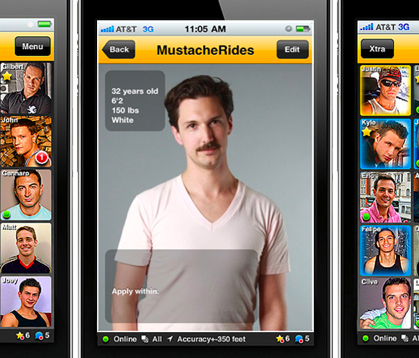If you read this blog, then you know I have a great love for the website/blog Gawker. I’m not here to write an open letter telling them how much I love them, but if I did, it would probably be directed to Brian Moylan.
Why? Because of this:

Image via Gawker
It all started about a week ago when news that Grindr, the social networking/cruising app for men who have sex with men had been hacked in Australia. People worried about their personal information being leaked, including conversations and pics that had been distributed via the app. (On a side note, looks like the person who hacked the app will not be prosecuted, or at least not at the time of this posting.)
Meanwhile, in a less sexually explicit realm of the internet (does such a thing exist?), Google has announced that it is getting rid of all its individual privacy policies for the various services that it maintains and will soon institute one umbrella policy for all. What does this mean? That Google can use the information you post in any of its various sites, programs, etc and use that to create ads that will be specific to you. Oh, and if you live under an online rock, Facebook is making its Timeline feature a permanent and non-negotiable part of your browsing experience, making all those stupid things you and your friends said on your wall in the past few years easily available for all to see.
In other words, people are starting to realize the permanence and permeability of online life. Just because what you said isn’t directly in front of your screen doesn’t mean that it doesn’t exist somewhere, or that someone can stumble across it pretty easily. Christ, I once found stuff I had written on a listserv back in 1995 (don’t bother looking; it was under an alias). Things don’t disappear into the ether.
Five days after the Grindr story broke, writer Brian Moylan did something I don’t believe any other journalist or blogger has done before. He posted his Grindr profile on the web, for all to see. Comments on the story were generally positive, with the occasional doubt cast on the veracity of his stats – “All true”, he laughs. Opinions ranged from, “Wow, you’re hot. Like, I would literally drag my dick through a mile of broken glass just to beat off to your shadow,” to “Dude – 6’2” and 150 lbs. I hope you get some hits on Grindr – you really need some protein.”
In the text accompanying it, Moylan jokingly admits to “whoring himself out” for viewing hits – he and his co-workers are having a contest to see who can get the most hits – but then he goes on to say something very telling:
“I’d like to say that putting the little ad I use to advertise myself on Grindr, a popular iPhone app that ranks gay men looking to meet other men for encounters of all sorts based on their proximity to the user, is some sort of comment about transparency. Since I would totally swipe a famous gay person’s Grindr photo and put it on the Internet, I should make my own available.”
So I emailed Moylan and asked him for an interview. He said yes but that his schedule was busy. After missed phone calls and a few back-and-forth emails, I got him on the phone as he was waking up. “It’s raining in New York, and I’m still in bed,” he says as he stretches. When I asked him about the post in question and his reasons for posting it, he said, “I thought it would be fun and funny. And you know, I totally would, if I found George Michael on Grindr, I would totally take a screenshot of it and put it on the internet for everyone to see. If I would do it, why should my profile be off-limits?”
And there it is. Although Moylan considers himself to be more of a writer than a journalist – although he has worked in journalism, notably for the gay newspaper The Washington Blade – he’s simply pointing out that the online world is a very public one. Just because you’re alone on your computer doesn’t mean you’re not in a public sphere. If Facebook can log all your chats and Google can send you ads based on the content of your emails, then putting your photo and having conversations on smartphone-based applications is just another dimension of the public realm.
Moylan is realistic about what his online presence means in terms of his own private life. “There are some things that I will show on the internet and some things that are just for people who are close to me. I don’t talk about my family online, just ‘cause. That’s not my place to share it.” He jokes that his father often reads his work, and in this particular instance, explaining what Grindr is and how it works was “a little bit of an uncomfortable conversation to have, but in the great realm of things, it wasn’t too bad.”
Moylan himself admits to having people occasionally recognize him from his work on Gawker when he uses the app. But he likens it to being seen in any public arena. “It’s like going to a department store,” he says. “If someone sees you in a department store, you can’t be like, ‘Oh, yeah, I don’t go to this department store,’ because you’re there! It’s like going to a gay bar; just as many people can see you. And yeah, I go to gay bars all the time and I go to Grindr all the time.”
When discussing the issues around media personalities putting their personal, social or even artistic lives online – Sook Yin Lee almost losing her job comes to mind – Moylan isn’t concerned. “There are things I have said about people in the media industry that I think have probably been far more damaging to my career prospects,” he says. “I’ve probably pissed off a number of people who may have hired me in the future. I feel like that is more dangerous to my future employment prospects than the fact that people may or may not know I go on Grindr.”
We’ve all done it. We’ve all put our faces, personal information (and possibly more) on everything from personal ads to blogs to Tumblr posts to Facebook pages. Although we as a society are often kvetching about the lack of online privacy, I think we are arguably more suspect than those we seek to blame. Besides, who’s the one posting all this information? Really, we’re just giving it away. We treat our personal information like trash on the side of the road. We shouldn’t be surprised when someone enacts the “finders keepers” rule. But within that same frame, I think it’s time we give each other a bit more of a break when we are open about ourselves and our lives online. It’s hard to fault someone for doing something that we also do, have done or would do. So I applaud Brian Moylan for posting his Grindr profile on Gawker. Now, if only a certain silver fox anchor would do so . . .
Maybe during sweeps week.

 Why you can trust Xtra
Why you can trust Xtra


